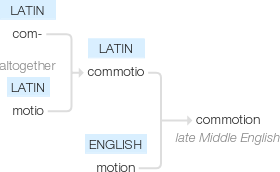Commotion
late Middle English: from Latin commotio(n- ), from com- ‘altogether’ + motio (see motion).
wiktionary
From Middle French commocion, from Latin commōtiōnem, accusative singular of commōtiō, from commōtus, perfect passive participle of commoveō.
etymonline
commotion (n.)
late 14c., "violent movement or agitation, emotional disturbance," from Old French commocion "violent motion, agitation" (12c., Modern French commotion) and directly from Latin commotionem (nominative commotio) "violent motion, agitation," noun of action from past participle stem of commovere "to move, disturb," from com "with, together," perhaps here "thoroughly" (see com-) + movere "to move" (from PIE root *meue- "to push away").
From mid-15c. as "public unrest or disturbance." Verbs commote "to disturb, stir up" (1852), commove (late 14c.) are marked "rare" in Century Dictionary.
